Is Morocco Safe? Guide to Safety, Risks & Travel Tips
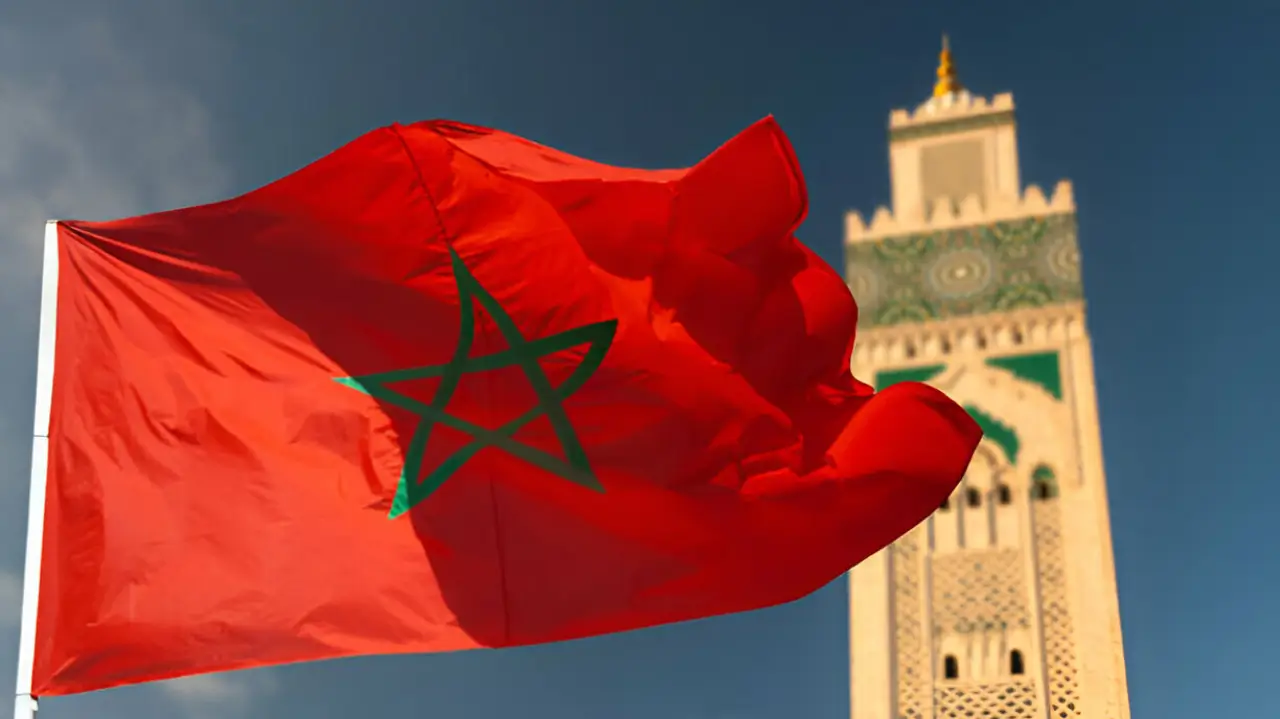
Is Morocco Safe? well Morocco attracts visitors with its lively markets, stunning mountains, and vast desert scenery. However, before setting off on your Moroccan journey, you might have concerns about safety. This detailed guide explores the real safety situation in Morocco, empowering you to make well-informed choices for a safe and memorable trip.
Is Morocco Safe?
Morocco is a captivating fusion of Arabic, Berber, and European influences, woven into its varied landscapes.
From the vibrant medinas of its imperial cities to the tranquil heights of the Atlas Mountains and the shimmering dunes of the Sahara Desert, the country enchants travelers with its cultural richness and breathtaking natural wonders.
Key Facts & Figures
- Population: Approximately 38 million
- Capital: Rabat
- Official Languages: Arabic and Berber (Amazigh), with French widely spoken
- Currency: Moroccan Dirham (MAD)
- Religion: Islam (predominantly Sunni)
- Tourism Volume: 17.4 million visitors in 2024, a 20% increase from 2023
- Travel & Tourism GDP Contribution: 18.6% of national GDP
Official Travel Advisories
Most major governments rate Morocco as a moderate risk destination:
- U.S. Department of State: Level 2 – Exercise Increased Caution
- UK Foreign Office: Advises against all but essential travel to Western Sahara
- Australia’s DFAT: Exercise a high degree of caution
- Canada: Exercise a high degree of caution
These advisories primarily stem from terrorism concerns and regional instability in neighboring countries rather than widespread safety issues within the country itself.
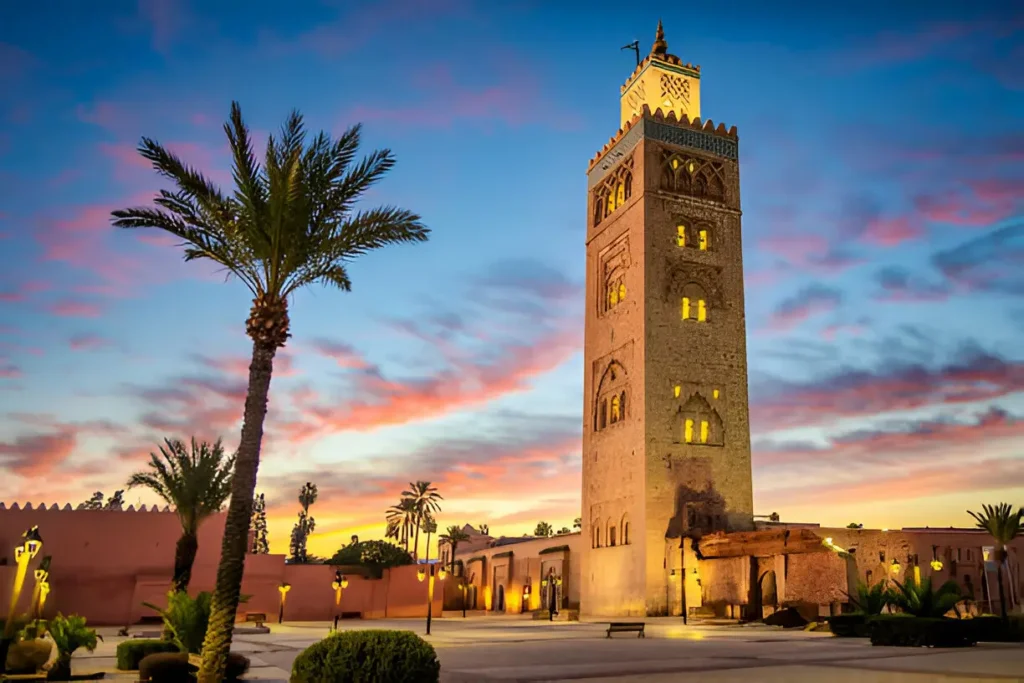
General Safety Overview
Overall, Morocco stands as one of North Africa’s safest countries for tourists. Violent crime targeting foreigners remains rare, though petty theft and scams in tourist areas require vigilance.
Terrorism Threat Level
Morocco maintains a moderate terrorism risk level. The country has experienced isolated incidents in recent years:
- December 2018: Murder of two Scandinavian tourists in the Atlas Mountains
- April 2022: Thwarted attack in Tangier
- January 2024: Arrest of 12 suspected militants in Casablanca
However, Moroccan authorities have strengthened counter-terrorism efforts significantly since 2018, dismantling numerous cells before they could execute attacks. The government has invested heavily in security infrastructure and intelligence capabilities, particularly in tourist areas.
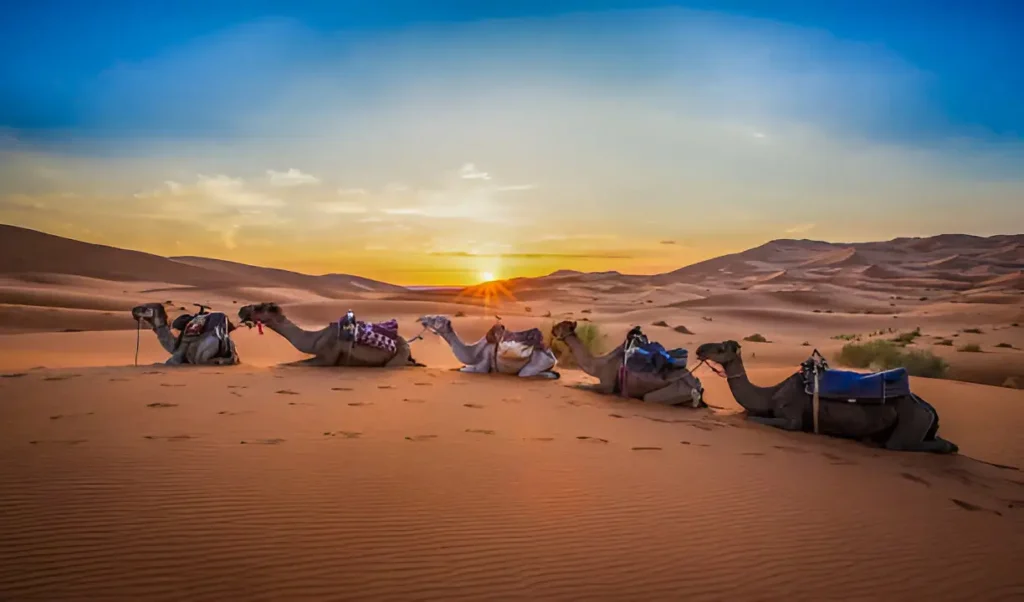
Crime Statistics & Trends
According to Morocco’s General Directorate for National Security (DGSN), crime rates affecting tourists have shown encouraging trends:
- Violent crime against tourists: Rare (fewer than 50 reported cases in 2024)
- Theft and pickpocketing: Common in crowded areas (approximately 3,200 reported cases in 2024)
- Harassment: Moderate (particularly for female travelers)
- Scams: Common (especially in marketplaces and tourist centers)
Most tourist-related incidents involve opportunistic petty theft rather than organized crime or violence. Hotspots include crowded markets, train stations, and popular tourist sites.
Government Tourism-Safety Initiatives
Morocco has implemented several programs to enhance tourist safety:
- Tourist Police: Specialized units in major destinations, easily identifiable in light blue uniforms
- Safety Apps: Government-sponsored “Morocco Safe” app with emergency features and location sharing
- CCTV Networks: Extensive camera coverage in tourist areas and major cities
- Tourism Security Committee: Multi-agency approach to tourist protection established in 2019
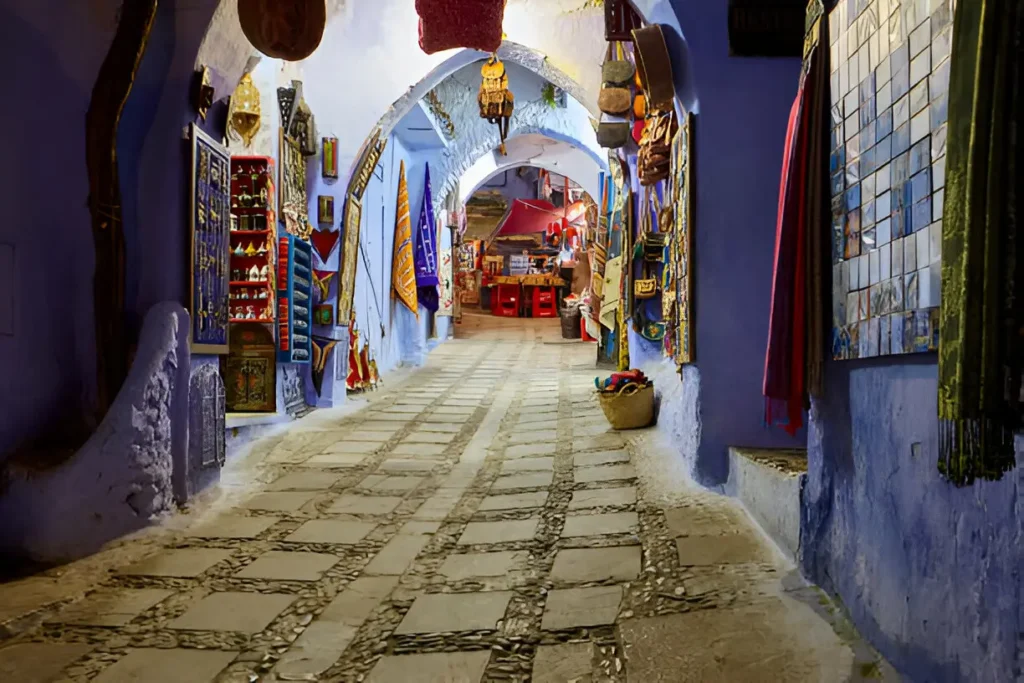
Travel Risk Management
For optimal safety, consider these fundamental strategies:
- Register with your embassy’s traveler program before departure
- Purchase comprehensive travel insurance with evacuation coverage
- Share your itinerary with trusted contacts
- Maintain digital copies of important documents
- Stay informed about local news and developments during your visit
Regional Safety Breakdown
Safety varies significantly across Morocco’s diverse regions and cities.
Is Marrakech Safe?
Marrakech remains Morocco’s top tourist destination and enjoys substantial security presence:
Safety Score: 8.5/10
- Medina (Old City): Petty theft and scams are common; maintain vigilance with belongings
- Jemaa el-Fnaa Square: Pickpocketing hotspot, especially during evening hours
- Gueliz (New City): Generally safer with fewer tourist-targeted crimes
- Resort Areas: High security standards, very low crime rates
Marrakech’s tourism police patrol frequency has increased by 35% since 2023, particularly in the maze-like medina where tourists may become disoriented.
Is Casablanca Safe?
As Morocco’s largest city and commercial hub, Casablanca presents a mixed safety profile:
Safety Score: 7.5/10
- Downtown & Business Districts: Generally safe during daylight hours
- Anfaplace & Corniche: Well-monitored tourist areas with good safety records
- Medina & Old City: Exercise caution, particularly after dark
- Outskirts & Suburbs: Some areas experience higher crime rates; research before visiting
Casablanca has fewer tourist police than Marrakech but maintains standard police presence throughout the city center.
Is Tangier Safe?
This northern port city has transformed significantly in recent years:
Safety Score: 8/10
- Renovated Historic Center: Well-policed with moderate safety concerns
- Port Area: Beware of touts and unauthorized guides
- Kasbah: Generally safe by day; exercise caution at night
- New City Development: Modern areas with enhanced security measures
Tangier’s proximity to Europe and status as a major entry point has prompted authorities to implement stricter security measures, especially around ferry terminals.
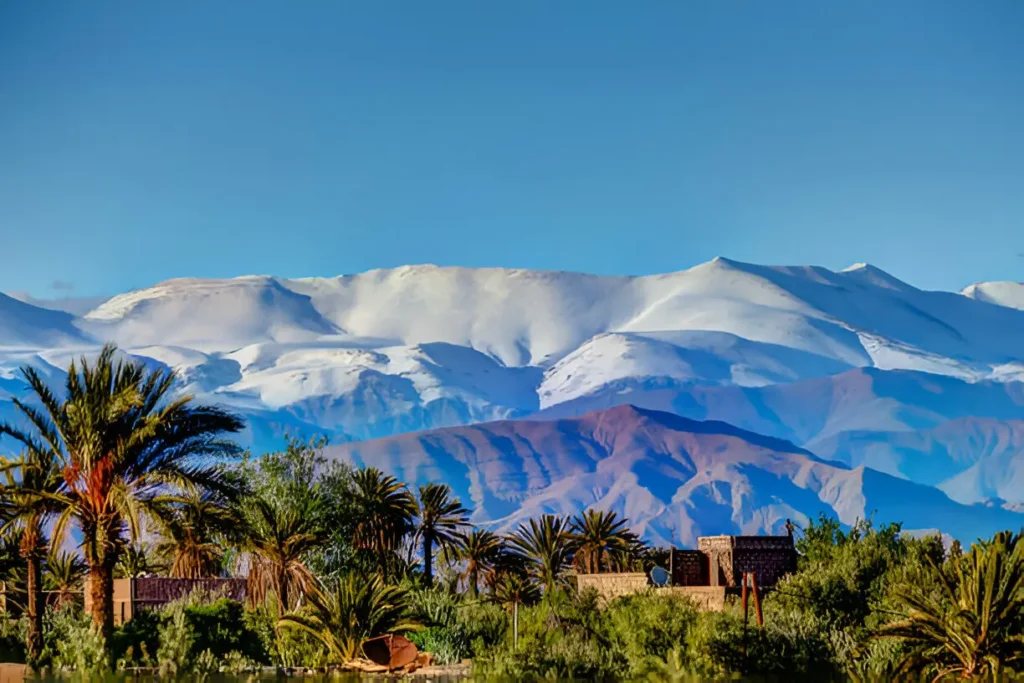
Atlas Mountains & Sahara Desert Areas
Remote areas present different safety considerations:
Safety Score: 6.5-8/10 (varies by specific location)
- Popular Trekking Routes: Generally safe with guides; avoid solo hiking
- Small Villages: Typically very safe with hospitable locals
- Sahara Excursions: Safe when arranged through reputable companies
- Border Regions: Western Sahara remains contentious; check advisories before travel
Following the 2018 incident involving tourists in the Atlas Mountains, authorities have increased patrols and implemented guide certification requirements in remote areas.
Health, Medical & Environmental Risks
Health considerations form an important component of overall travel safety in Morocco.
Healthcare Infrastructure
Morocco’s medical system varies dramatically between urban and rural areas:
- Major Cities: Modern private hospitals with international standards
- Rural Areas: Limited facilities with basic care capabilities
- Tourist Destinations: Medical clinics catering to foreigners, often with English-speaking staff
- Emergency Response: Inconsistent ambulance service outside major urban centers
The Joint Commission International accredits five hospitals in Morocco, all located in Casablanca and Rabat. Medical evacuation insurance is strongly recommended for travelers venturing beyond major cities.
Water & Food Hygiene
Gastrointestinal issues remain the most common health concern for visitors:
- Tap Water: Not recommended for drinking; widely available bottled water is safer
- Street Food: Exercise caution; choose busy stalls with high turnover
- Restaurants: Tourist-oriented establishments generally maintain good hygiene standards
- Raw Fruits & Vegetables: Wash with bottled water or peel before consuming
Recent government initiatives have improved food safety standards, with random inspections increasing by 40% since 2023, particularly in popular tourist areas.
Seasonal Hazards (Heatwaves, Flash Floods)
Morocco’s diverse climate creates varying environmental risks:
- Summer (June-August): Extreme heat in desert regions (up to 120°F/49°C)
- Winter (December-February): Snow and cold in mountains; flash floods in valleys
- Spring & Fall: Most temperate, but occasional sandstorms in desert areas
- Year-round: UV exposure risk due to intense sunlight
Climate change has increased the frequency of extreme weather events in Morocco, with flash floods becoming more common even outside the traditional rainy season.
Transportation & Accommodation Safety
How you move around and where you stay significantly impact your overall safety in Morocco.
Road, Rail & Air Travel
Transportation infrastructure quality varies considerably:
- Roads: Generally good in urban areas and major highways; challenging in remote regions
- Traffic Safety: Poor driving standards contribute to high accident rates
- Trains: Safe and reliable between major cities
- Domestic Flights: Good safety record with national carrier Royal Air Maroc
According to World Health Organization data, Morocco’s road fatality rate stands at 18.5 deaths per 100,000 population, substantially higher than most Western countries.
Taxi & Rideshare Tips
Local transportation requires specific precautions:
- Petit Taxis: City-specific colored taxis; insist on meter usage or agree on price beforehand
- Grand Taxis: Inter-city shared transportation; less regulated but generally safe
- Rideshare Apps: Careem and inDrive operate in major cities with tracking features
- Airport Transfers: Pre-arranged services offer the most reliable option
The government introduced standardized taxi fares in tourist cities in 2023, reducing fare disputes by approximately 60%.
Hotels & Riads Security Practices
Accommodation security varies by type and location:
- International Hotels: Highest security standards with 24/7 staff and CCTV
- Riads (Traditional Guesthouses): Security varies; research reviews thoroughly
- Budget Accommodations: Exercise greater caution with belongings and door locks
- Rental Properties: Investigate neighborhood safety before booking
Most tourist accommodations in Morocco now participate in the “Safe Stay” certification program launched in 2024, requiring minimum security standards including secure entry systems and staff background checks.
Personal & Digital Security
Beyond physical safety, protecting your personal information and belongings requires attention.
Common Scams & How to Avoid Them
Be aware of these frequently reported tourist scams:
- Fake Guides: Unauthorized “guides” leading tourists to commission-paying shops
- Price Switching: Merchants changing agreed prices at payment time
- Misrepresentation: Items sold as authentic that are mass-produced imports
- Helpful Strangers: People offering assistance but demanding payment afterward
The Tourism Ministry has established a scam reporting hotline (05522-TOURHELP) that received over 2,800 calls in 2024, resulting in fines for hundreds of businesses engaging in deceptive practices.
ATM, Credit-Card & Wi-Fi Safety
Digital security deserves special attention:
- ATMs: Use machines attached to banks during business hours
- Credit Cards: Keep cards in sight during transactions; check statements regularly
- Public Wi-Fi: Avoid sensitive transactions on unsecured networks
- Phone Security: Beware of shoulder surfing when using devices in public
Financial fraud targeting tourists increased by 15% in 2024, with compromised ATMs and card skimming devices representing the most common threats.
Special Considerations
Certain traveler demographics face unique safety considerations in Morocco.
Women Traveling Solo
Female travelers should prepare for cultural differences and potential challenges:
- Dress Modestly: Covering shoulders and knees reduces unwanted attention
- Harassment: Verbal harassment occurs frequently; ignore and move to populated areas
- Transportation: Sitting near other women on public transport enhances comfort
- Accommodation: Choose properties with 24-hour reception and secure entry
According to a 2024 survey of female travelers to Morocco, 68% reported experiencing some form of verbal harassment, though less than 5% felt physically threatened during their stay.
LGBTQ+ Travelers
Morocco presents challenges for LGBTQ+ visitors:
- Legal Status: Same-sex relations remain illegal with potential penalties
- Public Behavior: Discretion is strongly advised; avoid public displays of affection
- Social Attitudes: Conservative perspectives prevail in much of the country
- LGBTQ+ Spaces: Very limited and underground, primarily in Marrakech
While prosecutions against tourists are rare, cultural sensitivity and awareness of local norms remain essential for LGBTQ+ travelers’ safety.
U.S. Citizens & Other Nationals
Specific nationality considerations include:
- U.S. Citizens: Generally well-received; register with STEP program
- Israeli Citizens: Entry restrictions officially lifted in 2023; exercise discretion
- European Nationals: Comprise majority of tourists; well-established support services
- Embassy Support: Major nations maintain consular presence in Rabat, Casablanca, and Marrakech
The U.S. Embassy in Rabat reported assisting approximately 780 American citizens with various issues in 2024, primarily lost passports and medical emergencies.
Practical Preparation & Resources
Proper preparation significantly enhances travel safety in Morocco.
Visa & Entry Requirements
Entry procedures depend on your nationality:
- Visa-Free Entry: Citizens of numerous countries (including U.S., Canada, EU) can visit for up to 90 days
- Required Documentation: Valid passport with minimum six months validity
- Extension Options: Available through local police stations if needed
- Entry Cards: Complete accurately to avoid delays
Recent streamlining of entry procedures has reduced average processing time at major airports to under 30 minutes.
Travel Insurance & Medical Evacuation
Comprehensive coverage is essential:
- Medical Coverage: Minimum $50,000 recommended
- Evacuation Insurance: Critical for adventure activities and rural travel
- Policy Verification: Ensure Morocco is not excluded from coverage
- Claim Procedures: Document thoroughly and keep receipts for all expenses
Medical evacuation from remote areas to adequate facilities can cost $25,000-50,000 without insurance coverage.
Emergency Contacts (Police, Ambulance, Embassy)
Save these essential numbers before travel:
- General Emergency: 190
- Police: 19
- Ambulance: 15
- Fire Department: 15
- Tourist Police: 05377-68888
U.S. Embassy in Rabat: +212-537-637-200 (24/7 emergency line available)
Language & Communication Tips
Communication strategies enhance safety:
- Basic Arabic/French: Learning key phrases shows respect and improves interactions
- Translation Apps: Google Translate works offline with downloaded language packs
- Local SIM Cards: Affordable and provide reliable connectivity
- Emergency Phrases: Learn how to call for help in Arabic or French
Morocco’s telecommunications infrastructure provides reliable coverage in populated areas, with 4G available in most tourist destinations and 5G in major cities.
Further Resources & Stay Connected
Latest Posts
- 10 Essential Moroccan Phrases Every Traveler Should Know
- What to Pack for Morocco: Season-by-Season Guide
- Navigating Moroccan Culture: Dos and Don’ts
Disclaimer: This information was compiled from various governmental and independent sources and was accurate at the time of publication. Safety conditions can change rapidly; always check current advisories before travel.

One Comment